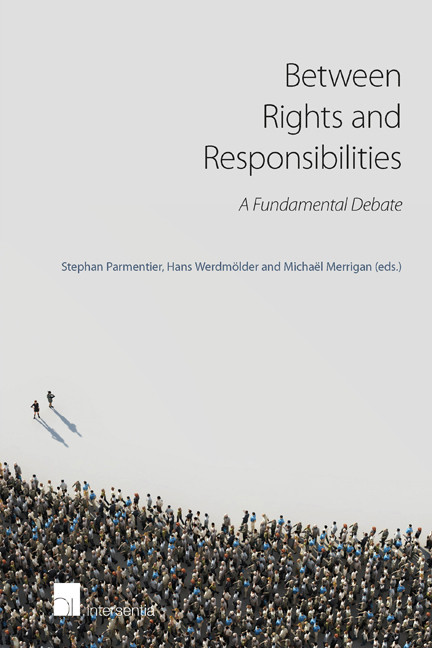Book contents
- Frontmatter
- Foreword
- Contents
- About the Authors
- Introduction: Towards an Integrated Vision of Rights and Responsibilities
- PART I FUNDAMENTAL RIGHTS AND FUNDAMENTAL RESPONSIBILITIES: SETTING THE SCENE
- PART II RIGHTS AND RESPONSIBILITIES IN SPECIFIC CONTEXTS
- Human Rights in a Globalising Economy. Is the Right to Social Protection Qualified by a Duty to Work?
- Human Rights in a Globalising Economy. Rights and Responsibilities of Trade Unions
- Fundamental Rights and Responsibilities within a Multicultural Society
- From Lawless to a Human Rights Approach in the Fight Against Terrorism. The Council of Europe Standards
- Children's Rights at a Dignitarian Horizon of Responsible Parenthood
- Individuals’ Duties in the African Human Rights Protection System. Challenges and Prospects
- Declaration of Human Duties and Responsibilities
Human Rights in a Globalising Economy. Rights and Responsibilities of Trade Unions
from PART II - RIGHTS AND RESPONSIBILITIES IN SPECIFIC CONTEXTS
Published online by Cambridge University Press: 22 November 2017
- Frontmatter
- Foreword
- Contents
- About the Authors
- Introduction: Towards an Integrated Vision of Rights and Responsibilities
- PART I FUNDAMENTAL RIGHTS AND FUNDAMENTAL RESPONSIBILITIES: SETTING THE SCENE
- PART II RIGHTS AND RESPONSIBILITIES IN SPECIFIC CONTEXTS
- Human Rights in a Globalising Economy. Is the Right to Social Protection Qualified by a Duty to Work?
- Human Rights in a Globalising Economy. Rights and Responsibilities of Trade Unions
- Fundamental Rights and Responsibilities within a Multicultural Society
- From Lawless to a Human Rights Approach in the Fight Against Terrorism. The Council of Europe Standards
- Children's Rights at a Dignitarian Horizon of Responsible Parenthood
- Individuals’ Duties in the African Human Rights Protection System. Challenges and Prospects
- Declaration of Human Duties and Responsibilities
Summary
INTRODUCTION
In addressing the role of trade unions in the local, national and international economy, many commentators, both within the labour movement as well as outside, tend to focus quite narrowly on the role of unions in organising and representing workers in the workplace. This is not surprising given that the fundamental objective of the trade union movement is to ensure the social and economic well-being of workers, and a common experience affecting that wellbeing is what happens in the workplace. Thus union activity aimed at improving wages and working conditions obviously serves to achieve that fundamental objective.
But workers’ social and economic well-being is not solely affected by what occurs within the workplace, and trade unions have a role in influencing government policies on economic and social issues generally, and in working to insure political and civil rights. Not only is this role consistent with the fundamental objectives of the trade union movement, it is a responsibility which unions assume as the beneficiary of the rights to association, assembly and free speech.
UNIONS AS BENEFICIARIES OF HUMAN RIGHTS PROTECTION
The Universal Declaration of Human Rights recognises as a basic human right the right to freedom of association, and in particular the right to form and join trade unions. Other international and regional instruments recognising the right to association also specifically mention the right to form trade unions. Unions have benefited from the protections accorded by these and other international instruments in securing their ability to freely operate to protect worker interests.
The right to association, however, is not only a good in itself, i.e. as an individual freedom to form human relationships, but is also a means to achieving other goods; in the case of trade unions it also provides a means of ensuring the social and economic well-being of workers. It is this instrumental aspect of freedom of association which encompasses the obligation to use that freedom in ways that will advance human rights and dignity for the community as a whole.
This instrumental responsibility has been directly addressed in the 1998 UN Declaration on the Right and Responsibility of Individuals, Groups and Organs of Society to Promote and Protect Universally Recognized Rights and Fundamental Freedoms (UN Declaration).
- Type
- Chapter
- Information
- Between Rights and ResponsibilitiesA Fundamental Debate, pp. 113 - 124Publisher: IntersentiaPrint publication year: 2016

